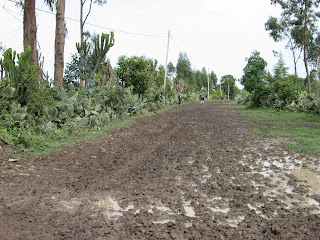It's time to talk about tweedle beetles...no wait...that's Dr. Seuss...it's time to talk about smallholder farmer inputs. You're not allowed to be bored; I swear this is really interesting and cool (also incredibly frustrating in its current state).
Having now seen how things work on the ground, I understand the farmers here a lot better. The current problems (or more optimistically / consultanty "opportunity areas") are too many to enumerate here. Lets take a big one, though. One of the issues is how interdependent all the pieces are, so you can't just fix one part of the system. For example, my team has been working a lot on providing input credit to farmers to buy fertilizer, improved seed, and chemicals. There have been significant hurdles in providing input credit this year, and even for those farmers who received credit, fertilizer quality and access to improved seed were major problems. If farmers don't get the fertilizer and improved seed they need to increase yields, then providing them with credit is counterproductive (causes them to go into debt without a way to pay it off). Availability of high-quality improved seed was a major issue this year. Many places didn't get improved seed (or at least not anywhere near enough of it). Much of the improved seed was terrible (and I mean terrible quality) with up to 10% of the seed crushed or with weed seed mixed in. Also, most of the improved seed that was delivered was delivered late, so farmers had already planted with 2-3 year old seed bought from their neighbors.
This is before we even consider the need for insurance and ensuring buyers exist for the increased production (there's a horror story about an NGO that got a gruop of farmers to produce "high-value" crops, in this case tomatoes, but didn't find them a connection to the market; the tomatoes ended up rotting on the side of the road). Lots of people at various stakeholders talk about how farmers are so risk averse that they won't adopt the right practices/technologies. Given the far-from-perfect systems they have to work with, I bet you'd be risk averse, too. Unless the farmer has the option to adopt the entire system of financing and all the necessary improved inputs (and where possible insurance, mechanization, and output aggregation), you can't expect her/him to adopt one piece of that package.
Remember, these are farmers living very close to the ultimate poverty line...the one with starvation on the other side of it. If you take a risk on something new and it doesn't pan out, that is a choice with literal life or death consequences.
All this is to say I now really understand the appeal of the One Acre Fund model, where you take a small group of farmers and provide them with a holistic solution (providing all the inputs, training, and finance they need). Then, you scale it to more and more farmers every year. There are major victories to be had working at the country-wide level in government (like I am now) because if you get something right it can benefit millions of farmers. Getting things right with the existing system (instead of creating a new system without the "path dependence" of the old system) can frequently be tricky, though. There's a reason companies rarely disrupt themselves and are almost always disrupted by new competitors who don't have the same history weighing them down (see anything Clayton Christensen's ever written if you want to better understand these dynamics).
All right, now I'm getting sad. Give me a hit of the good stuff...
Ah...there it is...that's what I'm talking about.
Let me point out that things are definitely trending in the right direction and significant progress is being made. Many stakeholders (from government to NGOs to the private sector) are working really hard to improve things. It's just that sometimes we take a step backwards in order to move forwards, and that, combined with the slow rate of progress, can be frustrating.
Despite all this and their very justified complaints about the systems, in general, all the farmers we spoke with were happy...just good people doing their best to get by.
Sorry this was one of those rambling "why can't we fix the world faster" posts. More pictures of farmers, MFIs, etc. next time, I promise.





Amazing. I think that I am finally starting to understand what you are trying to do is all about. Thanks.
ReplyDelete